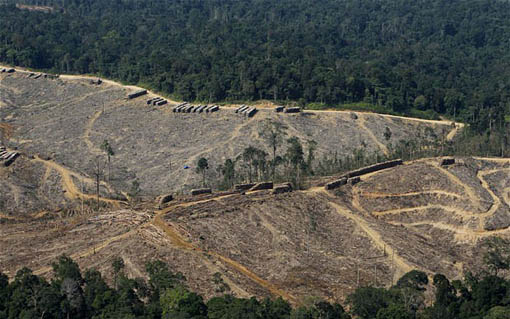You are hereBlogs / WcP.Observer's blog / Earth polluted: aerial photo. Brazil: oil spill; new law'll cost Amazon forest loss size of Germany, Italy and Austria combined
Earth polluted: aerial photo. Brazil: oil spill; new law'll cost Amazon forest loss size of Germany, Italy and Austria combined




*Update Nov. 6, 2011 - "Brazil's Senate passed a landmark reform of the country's land law on Dec. 6, 2011... could spark a new wave of deforestation in the Amazon region"
(quote)
These are among the most beautiful photographs ever taken - and the ugliest: aerial images show the damage caused by industrial pollution, but they also capture the striking vivid colours created by toxic waste. "Red mud" bauxite waste from aluminium production containing significant amounts of heavy metal contamination, in Darrow, Louisiana.
Brazil 'risks loss of forest area equal to Germany, Italy and Austria': An area of forest equal to Germany, Italy and Austria combined could be lost forever if Brazil's senate approves new laws on land clearance to be voted on within days.
Deforestation in the Brazilian Amazon has declined steadily since 2004 and fell to the lowest level on record in the year from August 2009 to July 2010 following improved satellite monitoring and tougher enforcement. But this year has already seen signs of a resurgence in several areas and environmental groups believe proposed changes to Brazil's Forest Code will exacerbate the problem in the Amazon and beyond.
They warn that the legislation would open up vast swathes of the world's biggest rainforest to uses such as cattle ranching and soy production and end hopes of replanting many illegally cleared areas.
According to WWF, Brazil's efforts to position itself as a "global environmental leader" risk being severely damaged before it hosts the UN Conference on Sustainable Development - known as Rio+20 - in Rio de Janeiro in June next year.
Maria Cecilia Wey de Brito, WWF-Brazil's CEO, said: "We are watching, just before Brazil hosts Rio+20, a clear attempt to dismantle Brazil's environmental legislation. This is something unprecedented in our history." She warned that "input from scientists, researchers, family farmers and social groups has been systematically ignored" by Brazil's upper and lower houses of parliament.
WWF said studies suggest the new legislation could see 175 million acres of forest – an area roughly equivalent to Germany, Italy and Austria together – cleared or not restored following illegal deforestation.
The laws would "likely make it impossible" for Brazil to meet its commitment of reducing deforestation by 80 per cent by 2020 compared to its average rate from 1996 to 2005, the charity said.
The new bill will update the Forest Code, which dates back to 1965 and applies to the nearly 5.2 million farmers and owners of rural land in Brazil, around 90 per cent of whom are considered small landowners.
The current code requires them to keep a certain percentage of their land as untouched forest, varying from 20 per cent in some areas to 80 per cent in the Amazon. But around nine out of 10 landowners are believed to fall short of full compliance.
The new laws, already passed by Brazil's lower house in May, would see an amnesty from heavy fines granted to landowners who cleared forest illegally between 1965 and July 2008.
They would also see rules on the clearing of hills relaxed and safeguard forest areas bordering rivers to between 100 and 330 feet from the river bank – figures criticised as insufficient by scientists and conservationists.
Agriculture has played an important role in Brazil's economic rise. The country is now the world's leading producer and exporter of coffee and sugar cane, the biggest beef exporter, largest producer of oranges and second largest producer of soy.
Senator Katia Abreu, president of the Brazilian Confederation of Agriculture and Livestock, has led an aggressive campaign for a reduction in environmental regulations on agricultural producers to help further boost food output.
She claimed in a recent interview that Brazil's farmers could lose $100bn if the deforestation amnesty is not passed and they were forced to reforest large areas.
Brazil's Senate is due to vote on the bill before the end of November and it will then be sent back to the lower house before going to President Dilma Rousseff for approval.
Despite minor amendments Ms Rousseff will come under pressure to honour a 2010 election campaign pledge to veto legislation likely to increase deforestation, amid growing concern from conservationists that the bill could become law this year.
Marcio Astrini, of Greenpeace's Amazon Campaign, said: "The president has respected the progress of the bill without commenting, letting it follow its course of destruction. "In the next phase, she will have to keep her word to veto or break her campaign promises."
Magda Chambriard, director of Brazil's National Petroleum Agency, said during a press conference Monday that Chevron "acted in complete violation of its concession contract and Brazilian law."
Officials said the company was unprepared to respond to the spill and accused it of editing video images of the oil seeping from the ocean floor, which Chevron denies doing.
Haroldo Lima, president of the petroleum agency, which wields authority over who can drill offshore, pledged closer scrutiny of Chevron. He also said of the company's recent request to drill another well in the same field, "the result may not be what the company expected previously."
Chevron on Sunday admitted making a critical error that it believes led to the spill, which the company and regulators estimate at between 2,400 and 3,000 barrels of oil. (By comparison, BP PLC's Deepwater Horizon disaster in the Gulf of Mexico spewed out 60,000 barrels a day.) The well is in about 4,000 feet of water 230 miles northeast of Rio de Janeiro.
(unquote)
Photos courtesy J Henry Fair, Reuters, Telegraph, and Rogerio Santana / Rio de Janeiro government / Associated Press



















brazi have prety nature. italy, austeria, germany and spain , too... south american and euro nature is my love...